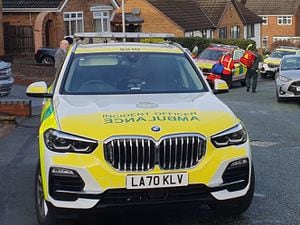Our butcher's shops face up to the chop
As shops close across the West Midlands and Shropshire, some are taking unusual steps to survive.
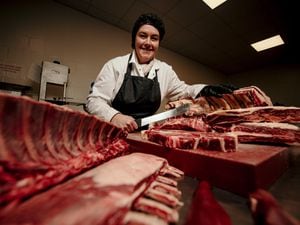
The traditional butcher’s shop is not just a relic of times gone by – but there’s no doubt that they are struggling.
Whether it’s a consequence of supermarkets’ convenience, shoppers’ changing habits, or the overall troubles of the retail sector, the number of old-school meat counters is on the wane.
Office for National Statistics data showed a nine per cent drop in butchers since 2010.
Across the West Midlands butchers have been lost over the last eight years. Wolverhampton, Shropshire and Sandwell have lost five, while Dudley lost 10 and the whole of Staffordshire and Staffordshire moorlands 15. Telford and Powys bucked the trend by maintaining the same number of shops.
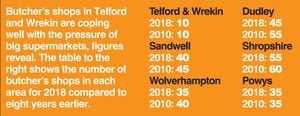
So for those that remain, they need to either be exceptional, or to provide something that others don’t.
For one business, that might mean that rather than selling the tried and tested cuts of beef, chicken or pork, they provide crocodile, ostrich, kangaroo or zebra.
Jeannie Tomlin owns and runs Alternative Meats with her business partner Rachel Godwin.
Their all-female team of butchers is based just outside Whitchurch, and there they supply what they describe as “something a bit different”.
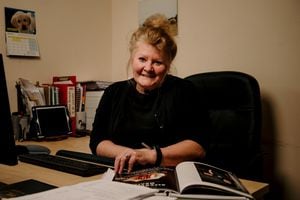
“The week we launched was at the exact same time as foot and mouth started,” said Jeannie.
As restrictions on moving livestock and meat around the UK and low confidence in meat consumption took hold, Alternative Meats was selling exotic meats which weren’t beset by the same troubles. Its exotic meats also helped it through the bird flu scare and the horse meat scandal.
“Although it was a tough start it really led us on to big and better things,” said Jeannie. “We were getting meat from abroad. We went to South Africa and Spain and sourced ostrich, antelope and springbok.”
It has since moved into a world of unusual British meat such as British Rose Veal, Welsh Wagyu Beef and Mangalitza Pork – although you can still get those exotic meats if you so choose.
“As long as we can get something ethically then we will supply it,” says Jeannie.
She says that there are many people producing unusual meats in the UK that can’t get to market because butcher’s shops and supermarkets are not interested.
For others, overcoming the decline in butchery has meant finding new ways to sell traditional meats. Russ Whetton was the owner of UK Fresh Meats in Telford which has recently merged with The Meat Man in Oswestry. Under the banner The Meat Man 75 per cent of the business is now online sales of meat.
While he does see the pressures that supermarkets impose on traditional butchers, he believes the growth of online meat sales is also taking a large chunk of their business.
Russ says that confusion over traditional weighing methods puts people off visiting their local butcher.
“The modern customer can be a bit intimidated by the traditional butcher,” he said. “They don’t really know what they are ordering for their money. Online ordering is the modern way to do it. Customers can see how much they are going to spend and they can get it delivered to their doors, it’s convenient and it ticks all the boxes.
“Traditional butchers won’t change. The way they do things is the way they do things. They won’t change their logos and they don’t advertise on things like Instagram and Twitter, which is where people are always looking.”
He believes that while pork, beef, chicken and lamb are the cornerstone of butchery and selling meat, he also says that diversifying into exotic meats makes the experience more exciting for the customer.
“The extra bits just make shopping more exciting and people are always looking for something a bit different,” he said.
Allan Bennett has been a butcher for 65 years and runs Allan Bennett Butchers in Codsall.
“The secret is all about doing the job right,” he said. “Everything we sell we make, we have complete control.
“We buy our livestock from Bridgnorth and we butcher it ourselves. We cure our own bacon, make our own sausages and our own pies.”
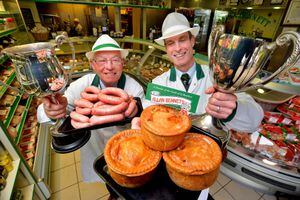
He believes this human touch keeps his customers loyal and away from the supermarkets.
Allan did at one time have another six shops in Wolverhampton but closed or sold them due to age and wanting to focus on the Codsall shop.
“It’s possible I would have sold up if my son hadn’t gone into the trade,” he said. “It is a lot of hard work when you do it all, it’s not like ordering meat in and putting it in the window.”
So is it supermarkets that are the real threat?
Chris Mallon, chief executive of the National Beef Association, said aggressive tactics from big chains are forcing many small businesses to close.
He said: “The steady decline of butcher’s shops in the last 30 years has been a result of the dominance of large retailers in the food sector, driving market prices down.
“For small butcher’s shops, it is near impossible to compete with supermarket deals such as ‘buy one, get one free’ and ‘special offers’.”
Mike Cherry, national chairman of the Federation of Small Businesses, added: “The biggest issue continues to be the outdated business rates system which disproportionately hurts small businesses.
“Businesses such as butchers must also contend with the changing lifestyles of their customers with an increasing interest in more sustainable ways of living.”
But Jeannie, from Alternative Meats, said that although there has been a drop, she doesn’t see that being a permanent state of affairs.
“The butcher’s shops that are left will get stronger as people care more about where their meat comes from,” she said. “People are getting away from the ‘pile it high and sell it cheap’ model.”


